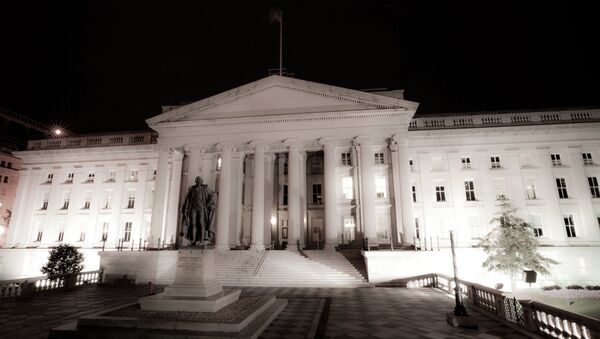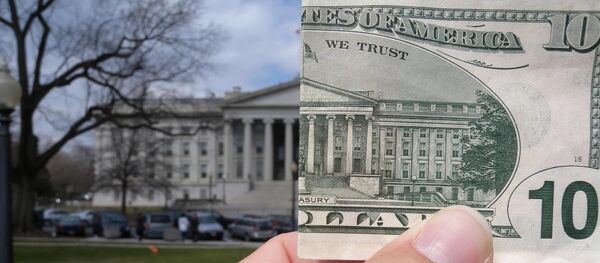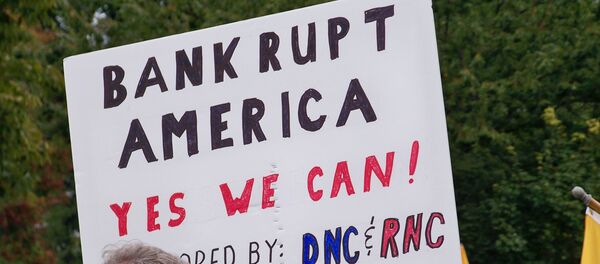"Using the position of the dollar as the world's reserve currency, the United States is able to stimulate its economy by increasing public debt," Delyagin writes, in a recent article for independent Russian newspaper Svobodnaya Pressa.
"The ability to increase the debt is not just a guarantee of America's competitiveness and influence, but a condition of its economic existence. The US lives on borrowed money, which it forces the rest of the world to pay for. In 1980, the national debt was $0.9 trillion dollars (33% of GDP). By 1990 it was $3.2 trillion (55.9%). In 2000 it was $5.6 trillion (58%, assisted somewhat by Clinton's budget surpluses in the 90s). In 2010 it was $13.8 trillion (96.5% of GDP), and as of the end of January 2016, it sits at $19 trillion (103.7% of GDP).
"The main holder of the 'marketable' part of the debt, packaged as Treasury securities, is the Federal Reserve. Between November 2012 and November 2013 its share increased from $1.6 to $2.2 trillion, but its growth has since slowed, and its share now sits at slightly more than $2.5 trillion."
Liberal economists, Delyagin explains, "prohibit the countries that depend on them to finance their debts via their own central banks, but make an exception for the United States; the 'owners' have a right to ignore the rules they impose on the rest of the world."
"However, the situation in which the latter systematically finances a significant (if reduced) portion of the increased debt via the emission of more dollars is, in any case, an indication that there is a problem."
"The yield of US debt securities is low. A 10-year treasury currently yields less than 2%. However," the economist clarifies, "this is still higher than the yield of many other market instruments in the face of the [global financial] crisis."
"And since US debt is the most reliable financial instrument, not only corporations, but also governments temporarily hold their free resources in Treasury securities – in other words investing in the largest Ponzi scheme in the world. But so far, with the support of America's military, technological and informational might, including their control over the global media and the elites of developed (and many undeveloped) countries, its securities, in spite of their ultimate strategic doom, remain the most reliable element of the global financial system."
"During the same period, Russian holdings of US debt have fluctuated sharply, initially falling by almost half, from $126.2 billion as of March 1, 2014 to $69.6 billion a year later, and then rising to $92.1 billion as of January 1, 2016. The maximum of Russian holdings was recorded in July 2011, when they sat at $151.7 billion, 7th among the foreign holders. Since then, Russia dropped from 12th to 20th place, and then climbed back up to 15th.
"This trend," Delyagin suggests, "corresponds to the state of the Russian currency market. US government bonds are the most liquid securities in the world; they are the easiest to maneuver: when the need for currency arises, they are simply and quickly sold, without losses, and when an opportunity to make a 'nest egg' arises, they are the most convenient way to do it."
"The fact that the very ideology of the 'nest egg', in Russia, which faces problems from a lack of investment, is criminal, is another matter. Russia's liberal economists are doing everything, under the most absurd pretexts, like fighting inflation, to prevent the investment of resources in the country's development."
Instead, "the dynamic of Russian investments in the US's national debt is determined by an accounting consideration – based on the growth or reduction of the reserves of the Russian Central Bank."
At the same time, the economist notes, "similar investments by other countries are often strategic. China, having grown its holdings to a dizzying height (over $4 trillion), demanded, during a period of the dollar's devaluation, that the US guarantee its dollar assets against depreciation. Since this periodic depreciation is one of the key factors of the US's enrichment, China's appeal was contemptuously ignored, and Beijing has since taken measures to restrain the growth of its holdings."
"Japan meanwhile, panicked by a strengthening China, has clung to the United States as its sole defender, and follows its interests even to their own detriment (as was demonstrated, for example, in relation to the West's anti-Russian sanctions). Therefore, Tokyo has, if only slowly, increased its investment in US treasuries."
"Usually," Delyagin explains, "the dynamics of investment in US government debt are determined based on the dependence on the US, and the state of a country's economy. One might argue about whether the reductions in investment by Australia or Vietnam are a reflection of economic problems, or an indication of a shift from the US toward China. However, the increases between 2015-2016 by the countries of the Caribbean (from $272.4 to $351 billion), by oil exporting countries, including OPEC and Indonesia (from $285.9 to $292.5 billion) and by Spain, which is choking from crisis (from $27.2 to $36.2 billion) are difficult to interpret otherwise than as a demonstration of political submission."
"Of special note is Belgium, which between late 2013 to early 2014 grew its holdings of US government debt by over $200 billion, despite the fact that it faces a difficult financial situation. It's true, they did shrink them by more than $90 billion in February 2015, and then by another $100 billion between July and August. It's possible that this was an operation by the Fed itself to try out financing part of the national debt via a third party, before deciding not to repeat the experience. Or, perhaps Belgium was used as a cover by other international investors – for example, those belonging to global crime syndicates."
Ultimately, Delyagin argues, "the reduction of Russian investment into US Treasury securities should not be a reflection of the flow of our foreign reserves into the pockets of speculators, but an expression of our relationship to the instigators of a 'new Cold War', and a result of the modernization of our country's infrastructure."







